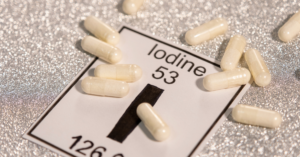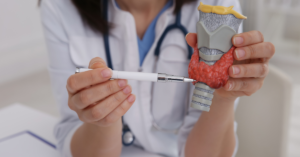Hypothyroidism in Children: Critical Signs and Symptoms Every Parent Should Know
Did you know that thyroid disorders are more common than you might think? In the United States, nearly 12% of people will develop a thyroid condition during their lifetime. In India, the numbers are even more staggering—around 42 million people suffer from thyroid-related diseases (PubMed).
These disorders can affect people of all ages, including children and even newborns, making early detection and management crucial for overall well-being.
Causes of Hypothyroidism in Children

The most common cause of hypothyroidism in children is a family history of thyroid disease. If a child’s parents, grandparents, or siblings have hypothyroidism, their risk increases significantly. This is especially true for families with a history of autoimmune conditions that affect the thyroid.
Autoimmune thyroid diseases like Hashimoto’s thyroiditis and Graves’ disease often emerge during puberty and are more prevalent in girls than boys. These conditions cause the immune system to attack the thyroid, leading to hormonal imbalances and reduced thyroid function.
Beyond genetics and autoimmunity, other key causes of childhood hypothyroidism include:
✅ Iodine deficiency – Essential for thyroid hormone production, a lack of iodine can impair thyroid function.
✅ Congenital hypothyroidism – Some children are born with an underdeveloped or absent thyroid gland, affecting hormone levels from birth.
✅ Maternal thyroid dysfunction during pregnancy – If a mother has untreated thyroid disease, it can impact fetal thyroid development.
✅ Pituitary gland abnormalities – The pituitary gland controls thyroid function, and abnormalities can disrupt thyroid-stimulating hormone (TSH) production.
Symptoms of Hypothyroidism in Newborns

Hypothyroidism can develop at any age, but in newborns, the symptoms often appear within the first few weeks or months. These signs are usually subtle and easy to miss, making early diagnosis crucial for healthy growth and development.
Common symptoms of hypothyroidism in newborns include:
🟡 Yellowing of the skin and eyes (jaundice) – Due to difficulty processing bilirubin.
🚼 Poor feeding – Weak sucking reflex and reduced appetite.
💩 Constipation – Slower digestion due to low thyroid hormone levels.
❄️ Cold skin – Poor temperature regulation.
😶 Decreased crying – Less frequent or weak crying compared to other infants.
😮 Loud breathing – Noisy or raspy breathing due to an enlarged tongue.
😴 Excessive sleepiness – Sleeping longer than usual and appearing lethargic.
👶 Larger soft spot on the head (fontanelle) – A delayed closure of skull bones.
👅 Enlarged tongue (macroglossia) – A swollen tongue that may cause feeding difficulties.
Why Early Detection Matters
If left untreated, congenital hypothyroidism can lead to developmental delays, growth issues, and intellectual impairment. Newborn screening tests help detect the condition early, allowing for timely treatment and normal development.
Symptoms of Hypothyroidism in Toddlers and School-Age Children

Hypothyroidism in early childhood can manifest differently based on age, impacting growth, development, and metabolism. Common symptoms include:
Physical Growth & Developmental Signs:
📏 Shorter-than-average height – Slower growth compared to peers.
🦴 Shorter limbs – Delayed bone growth affecting arms and legs.
🦷 Delayed permanent teeth eruption – Teeth may take longer to appear.
⏳ Late-onset puberty – Puberty may be delayed beyond the expected age.
Cognitive & Metabolic Symptoms:
🧠 Slowed mental development – Learning difficulties or delayed cognitive milestones.
💓 Slow heart rate (bradycardia) – A heart rate lower than the normal range.
💇 Brittle hair – Hair may become dry, coarse, or prone to breakage.
😊 Puffy facial features – Swelling in the face, particularly around the eyes.
Early Signs That Mimic Adult Hypothyroidism in Children:
😴 Constant fatigue – Feeling unusually tired or sluggish.
💩 Frequent constipation – Digestive issues due to a slower metabolism.
🧴 Dry skin – Skin may become rough, flaky, or irritated.
Why Recognizing These Symptoms Matters
If left untreated, hypothyroidism can impact physical growth, puberty, brain development, and overall well-being. Regular check-ups and thyroid screenings can help detect thyroid dysfunction early and ensure timely treatment.
Hypothyroidism in Teenagers: Signs and Symptoms

Hypothyroidism is more common in teenage girls than boys and is often caused by Hashimoto’s thyroiditis, an autoimmune condition. Teens with a family history of autoimmune diseases—such as Hashimoto’s thyroiditis, Graves’ disease, or type 1 diabetes—have a higher risk of developing thyroid issues. Additionally, genetic disorders like Down syndrome also increase the likelihood of thyroid dysfunction.
Physical Symptoms of Hypothyroidism in Teens:
📈 Unexplained weight gain – Even without changes in diet or activity.
📏 Slowed growth – Teens may not reach expected height milestones.
👶 Looking younger than their age – Due to delayed physical development.
🦷 Delayed puberty – Slower progression through puberty stages.
🩸 Irregular or heavy menstrual periods – Girls may experience late periods or abnormal bleeding.
🎤 Hoarse voice & thyroid swelling – The thyroid gland may enlarge (goiter), leading to a deep or raspy voice.
💇 Brittle hair and nails – Hair may become dry, coarse, and prone to breakage.
🧴 Dry skin – Skin may appear rough and flaky.
💪 Muscle & joint pain – Stiffness, aches, or discomfort.
🚽 Constipation – Slowed digestion, leading to bloating and irregular bowel movements.
Behavioral and Emotional Symptoms:
😴 Constant fatigue – Feeling tired even after adequate rest.
🧠 Forgetfulness & trouble concentrating – Difficulty focusing, often mistaken for lack of attention.
📚 Poor school performance – Struggling with studies despite effort.
😢 Depressed mood – Feeling down or unmotivated without a clear reason.
😡 Mood swings or irritability – Sudden emotional changes or unexplained frustration.
Why Early Diagnosis is Crucial
Hypothyroidism in teenagers can affect their physical growth, emotional well-being, and academic performance. Regular thyroid screening is essential—especially for teens with a family history of autoimmune disorders or genetic conditions like Down syndrome.
Diagnosis and Treatment of Hypothyroidism in Children
Diagnosis

Diagnosing hypothyroidism in children involves a combination of clinical evaluation, hormone testing, and imaging studies. The method used depends on the child’s age, symptoms, and risk factors.
🩺 Newborn Screening for Congenital Hypothyroidism
📌 Approximately 1 in 2,000 to 1 in 4,000 newborns is diagnosed with congenital hypothyroidism (CH) through newborn screening programs (NCBI).
📌 These screenings are critical for early detection, as symptoms may not be obvious at birth due to maternal thyroid hormone transfer.
🧪 Key Diagnostic Tests
✅ Blood Tests – Measure levels of:
- Thyroid-Stimulating Hormone (TSH) – Elevated in primary hypothyroidism due to thyroid dysfunction.
- Free Thyroxine (Free T4) – Low levels confirm hypothyroidism.
✅ Thyroid Imaging (in select cases):
- Ultrasound – Determines the presence, size, and location of the thyroid gland.
- Radionuclide Scans (Iodine-123 or Technetium-99m) – Helps detect ectopic thyroid tissue, hypoplasia, or an absent thyroid gland.
✅ Other Tests:
- Thyroglobulin Testing – Differentiates between thyroid agenesis and dyshormonogenesis.
- Genetic Testing – Used for suspected familial or syndromic hypothyroidism, such as Pendred syndrome or TSH receptor mutations.
🦠 Goiter Evaluation
An enlarged thyroid (goiter) may indicate thyroid dysfunction or iodine imbalance. If present, a doctor will:
✅ Perform a neck examination to check for swelling, tenderness, and difficulty swallowing or breathing.
✅ Use ultrasound or further tests if a structural issue is suspected.
Treatment
Early and consistent treatment is crucial to prevent cognitive impairment, growth delays, and long-term complications.
💊 Levothyroxine (Synthroid) – The Gold Standard Treatment
✅ Daily oral levothyroxine (LT4) is the most effective treatment.
✅ The initial dose depends on the child’s age and severity of hypothyroidism:
- Newborns & Infants: 10-15 mcg/kg/day to quickly normalize Free T4 and TSH levels.
- Older Children: Dose is adjusted based on weight and regular thyroid function tests.
⏳ Why Early Treatment Matters
🛑 Newborns should begin treatment within the first 2 weeks of life for optimal brain development.
🛑 Delayed treatment (beyond 30 days) is linked to lower IQ and neurodevelopmental delays.
🛑 Regular monitoring ensures hormone levels remain stable, avoiding over- or under-treatment.
📊 Long-Term Management & Monitoring
🩸 Frequent blood tests are necessary to adjust treatment:
- Every 1-2 months in the first 6 months of life.
- Every 3-4 months thereafter until growth is complete.
📌 Thyroid hormone levels must stay within the normal range to prevent developmental concerns.
🔑 Key Takeaway
With early diagnosis and proper treatment, children with hypothyroidism can lead normal, healthy lives. Routine screenings, timely levothyroxine therapy, and regular monitoring ensure optimal growth, brain development, and metabolic health.
Conclusion: Why Early Detection and Treatment Matter

Hypothyroidism in children can affect growth, brain development, metabolism, and overall well-being. While symptoms may vary depending on age and severity, early diagnosis through newborn screening, blood tests, and imaging plays a crucial role in preventing long-term complications.
With timely intervention, children diagnosed with hypothyroidism can lead healthy, active lives. Levothyroxine therapy remains the gold standard for treatment, ensuring optimal thyroid hormone levels for normal development. Regular monitoring is essential to adjust dosages and prevent potential complications.
If you suspect thyroid dysfunction in your child—whether due to family history, developmental delays, or unexplained symptoms—consulting a healthcare provider is the first step toward effective management. With proper care, early detection, and lifelong monitoring, children with hypothyroidism can thrive and reach their full potential.
📌 Key Takeaway: Knowledge and proactive healthcare are the best tools against childhood hypothyroidism. Early diagnosis, the right treatment, and ongoing monitoring can make all the difference in ensuring a child’s long-term health and well-being. 🚀
- childhood hypothyroidism
- congenital hypothyroidism
- early signs of hypothyroidism
- growth delays in kids
- Hashimoto’s disease in kids
- hypothyroidism and puberty
- hypothyroidism causes
- hypothyroidism diagnosis
- hypothyroidism in kids
- levothyroxine treatment
- pediatric thyroid disorder
- signs of hypothyroidism
- symptoms of thyroid problems
- thyroid health for children
- thyroid hormone deficiency
- thyroid medication for kids
- thyroid screening for newborns
- thyroid symptoms in children
- thyroid treatment for kids
- underactive thyroid in children





